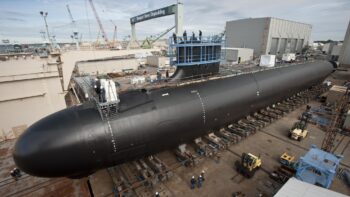
Sen. Dan Sullivan, R-Alaska, speaks during a news conference in the Capitol on inflation on Wednesday, Nov. 17, 2021. (Photo by Bill Clark/CQ-Roll Call, Inc via Getty Images)
WASHINGTON: In a rare clash of energy policy and defense politics, Republican Sen. Dan Sullivan today announced his intent to block the confirmation of two nominees for senior Pentagon posts until he receives answers from the Biden administration on the controversial suspension of a mining project in his home state of Alaska.
Sullivan said he plans to hold the nominations of Radha Plumb, who is nominated to be deputy under secretary of defense for acquisition and sustainment, and Laura Taylor-Kale, the administration’s pick for the assistant secretary of defense for industrial base policy. The move would keep both from moving to a Senate vote.
If eventually confirmed, Plumb will report to Bill LaPlante, the Pentagon’s top weapons buyer, overseeing billions of dollars spread across the Pentagon’s sprawling acquisition and sustainment apparatus. Meanwhile, Taylor-Kale’s mandate as the department’s lead on industrial base policy would include overseeing antitrust issues as well as working with LaPlante and Plumb on issues related to defense supply chain resiliency.
At the core of Sullivan’s objection is the administration’s decision to reassess the environmental impacts of building a new access road to the Ambler Mining District in the Alaskan northwest, which could provide the Defense Department and other US institutions with a domestic supply of critical minerals and rare earth resources, Sullivan said during a confirmation hearing for Plumb, Taylor-Kale and two other nominees.
“I can’t get answers from anybody in the Pentagon [or] at the Department of Interior. Why would you do this?” he said. “I think both of you are qualified. [But] until I get answers, I’m going to put a hold on both of your nominations until I get answers from high-level administration officials.”
Both Plumb and Taylor-Kale expressed concern with the Defense Department’s access to rare earth minerals but fell short of advocating specifically for the Ambler road project to move forward.
“We need to figure out ways to get onshore more reliable access to critical minerals and if confirmed, I would absolutely work on making sure I understand these cases [and] other cases like this, and make sure we robustly advocate for the right mix of investments and support to get that reliable supply chain for those critical minerals,” Plumb said.
“I understand how important this Ambler mine is to the people of Alaska and I thank you for raising the issue and for bringing this up,” Taylor-Kale said. She added that while she was “not familiar with all of the details” of the project, but “understanding of how we can better improve access to critical minerals and strategic materials will be absolutely important” for the Defense Department.
Should Plumb be confirmed into the deputy acquisition post, she indicated that she could oppose further defense consolidation, telling lawmakers that “consolidation … especially where it drives out competition and innovation is going to be problematic, and if confirmed, this is one of the areas I intend to focus on.”
RELATED: New Pentagon report sends warning shot for defense consolidation, especially in hypersonics
In responses to advance policy questions, Taylor-Kale said the COVID-19 pandemic and ongoing war in Ukraine “have laid bare some of the vulnerabilities in our defense industrial base and supply chain ecosystems,” and that her priority would be addressing those issues as well as mitigating longstanding challenges such as “foreign adversarial capital and investments” from nations like China, which can result in adversaries gaining access to intellectual property from US-based startups.
During the hearing, she voiced support for LaPlante’s plan to create “multiple hot production lines” for key technologies, and added that resolving “workforce issues [and] challenges with programmatic and budgetary stability” would also make the industrial base more resilient.
Air Force declares ‘critical’ Nunn-McCurdy cost breach for MH-139A Grey Wolf helo
The cost breach is driven by the service’s plan to cut the buy of the helicopter in half, not by any cost overrun in the program itself.

























